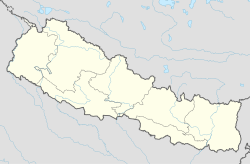Salahesh Fulbari
| Salahesh Fulbari | |
|---|---|
 | |
| Type | Municipal |
| Location | Lahan Municipality, Siraha District, Province No. 2 |
| Coordinates | 26°42′52″N 86°26′51″E / 26.71444°N 86.44750°E |
| Created | 1880s |
| Visitors | unknown |
| Status | Opens on first day of Bikram Sambat Calendar |
Salahesh Fulbari (Nepali: सलहेश फुलवारी), also known as Fulbari Mela, is a garden of historical and cultural significance to the south of East West Highway in Lahan Municipality, Siraha District, Province No. 2, Nepal. It is famous for an orchid that is believed to bloom only on the eve and first day of year, Baishakh, the first month of the Bikram Sambat calendar.[1] This funfair is held at 4 km West from the city of Lahan at the area of 14 Acres.[2]
Named after local demigod Salahesh, the garden receives thousands of pilgrims from different parts of Nepal and India each year on the first day of Baishakh. The orchid grown at the tree is taken as a token of love between Salahesh, who is often taken as a folk hero in the Mithila region, and his beloved Malini.[3] A temple has made with the statues of them at the side of the tree.[citation needed] The garden only opens on the New Year’s Eve. It is said that all the other days except than New Year day, the garden is filled with wild animals magically. Hence, no one is allowed to get into the premises on other days. According to priest, unlike other flowers, the leaves of this flower never fall on the ground, adding to the flower’s intrigue.[4]
Mythology[edit]
The funfair is organized on the myth of remembering King Salhesh's bravery, power, bravery, courage and love, a Hindu god, during 1325 BS. Legendary hero salahesh always use to visit with his beloved love "Jeeban Bhagat" Princess of Morang and daughter of King Maheswar Bhandari.[5] It is said that Dauna/Deena could not get the love of Salahesh throughout her life so once a year she comes as beautiful flower in this garden to meet Salhesh.[6][7]
References[edit]
- ^ Zirnis, Peter (9 August 2011). "Salhesh, Dusadh Hero". Mithila Painting.
- ^ "राजा सलहेश र मालिनीको प्रेम दिवस : स्वागतमा यसरी फूल्यो चमत्कारिक फूल". Dainik Nepal. Retrieved 2019-04-19.
- ^ "Visitors throng annual fair". The Himalayan Times. 2018-04-15. Retrieved 2019-04-19.
- ^ "New Year Flowers 2074 :Amazing Flower of the World Bloomed in Nepal". ImNepal.com. 2015-04-13. Retrieved 2019-04-19.
- ^ Yadav, Mithilesh. "King Sahlesh: The lesser known legend of Mithila". My Republica. Retrieved 2019-04-19.
- ^ cholan (2017-05-08). "The Festival of Salhesh • IAS Preparation Online". IAS Preparation Online. Retrieved 2019-04-19.
- ^ "Madhes and tourism: Abundant potential". The Himalayan Times. 2016-10-25. Retrieved 2019-04-19.

